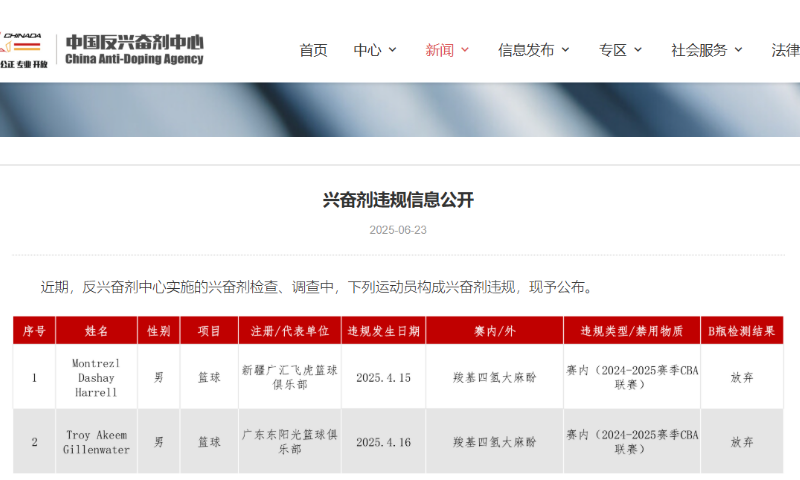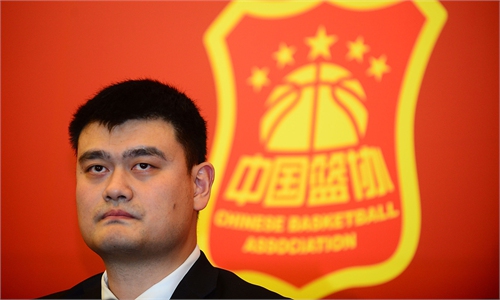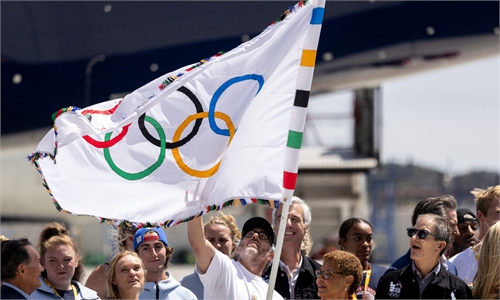SPORT / BASKETBALL
Two foreign players found in doping violation: Chinese Basketball Association

Two CBA foreign basketballers, Montrezl Dashay Harrell and Troy Akeem Gillenwater, have been found to have violated anti-doping regulations in the league, according to an announcement from the Chinese Basketball Association on Tuesday. Photo: Courtesy of China Anti-Doping Agency
Two CBA foreign basketball players, Montrezl Dashay Harrell and Troy Akeem Gillenwater, have been found to have violated anti-doping regulations in the league, according to an announcement from the Chinese Basketball Association (CBA) on Tuesday. It noted that the Chinese Anti-Doping Agency (CHINADA) released information on June 23 regarding doping violations detected during routine in-competition testing organized by the CBA League (Beijing) in April 2025.
"As for all Chinese basketball events, the CBA is under the unified anti-doping management of the CHINADA. Players are subjected to random testing during both the regular season and major matches, and urine tests are conducted after key games," Su Qun, a renowned basketball commentator, told the Global Times on Tuesday.
"Basketball, like swimming, fencing and other sports, follows the same uniform anti-doping standards. There are no different criteria simply because the sport is different. These standards are not decided by the CBA itself," Su said.
Harrell, a US professional basketball player who plays as a forward/center for the Xinjiang Flying Tigers, and Gillenwater, also a US player who serves as a power forward for Guangdong, both tested positive for Carboxy-THC, a metabolite of tetrahydrocannabinol, according to the CHINADA.
Hydroxy-THC is a psychoactive compound derived from the cannabis plant and is classified as a prohibited substance by the World Anti-Doping Agency. Both Harrell and Gillenwater waived their right to have their B-samples tested, which effectively indicates their acceptance of the doping test results, according to a report by Southcn.com.
The CBA stated in an official announcement that they are taking this matter very seriously and they are actively cooperating with the CHINADA in the ongoing investigation. The CBA also acknowledged that the two athletes involved have the right to request a hearing.
The association emphasized that once CHINADA issues its final decision, the CBA will strictly handle the case in accordance with anti-doping regulations and other relevant rules.
The CBA reiterated its firm opposition to any form of doping violations and stressed that it will continue to adopt a "zero tolerance" approach toward doping, in order to safeguard the integrity and fairness of basketball. Looking ahead, the CBA will further strengthen anti-doping education and awareness campaigns, improve related management policies and measures, and remain committed to maintaining a fair and just competitive environment.
Previously, Shandong player Tao Hanlin tested positive for a banned substance. Although it was caused by the accidental ingestion of clenbuterol, he was still immediately suspended from competition. Su noted that for foreign players, if an investigation confirms a violation, there will be no exceptions: Punishments will be determined based on the category and severity of the offense, in accordance with anti-doping regulations.
Doping incidents involving foreign players in the CBA are not unprecedented. Thirteen years ago, the league experienced its first such case when Marcus Williams, a US import playing for Shanxi, was sanctioned for a doping violation. He received a six-month suspension, while his club, Shanxi, was fined 10,000 yuan ($1,400), and head coach Zhang Degui was fined 5,000 yuan, according to the China News Service.
Beijing-based basketball fan Peng Tao pointed out that incidents like these involving foreign players are difficult for clubs to manage and often leave teams in a passive position. Reflecting on the 2011 case, Peng noted that Williams had admitted to using marijuana, claiming it was for medical purposes to ease chronic stomach pain.
"I've had a long history of stomach problems in the US, and the medical marijuana I used only served to relieve my condition. Before the game against Jilin, I had severe stomach pain, so I consumed a small amount of marijuana," Williams explained at the time.
Peng remarked, "Let's see how they will be punished this time. It's very likely these two players won't be allowed back into the CBA in the future."



